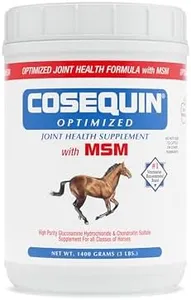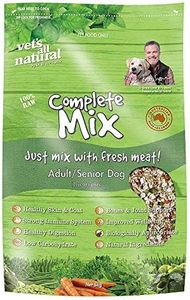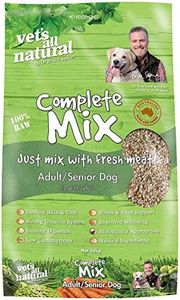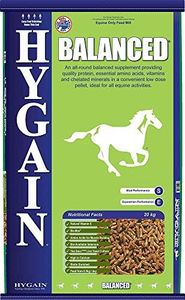We Use CookiesWe use cookies to enhance the security, performance,
functionality and for analytical and promotional activities. By continuing to browse this site you
are agreeing to our privacy policy
4 Best Senior Horse Feeds
From leading brands and best sellers available on the web.Buying Guide for the Best Senior Horse Feeds
Choosing the right feed for a senior horse is important for maintaining their health, energy, and overall well-being as they age. Senior horses often have different nutritional needs compared to younger horses because their digestive efficiency decreases, and they may have dental issues or chronic health concerns. When picking a senior horse feed, understanding the ingredients and nutritional benefits can help you support your horse's unique needs. Always observe how your horse responds to new feed, and consult with a veterinarian if you are unsure.Protein ContentProtein is an essential nutrient for maintaining muscle and supporting aging body functions in horses. The protein percentage in senior feeds typically ranges from moderate to high. Lower protein feeds (around 10%) are fine for less active or overweight seniors, while higher protein feeds (14-16%) are better for those that need help maintaining muscle mass or have trouble holding weight. Your choice should depend on your horse’s body condition and activity level; horses with muscle wasting or poor coat quality benefit from feeds with higher protein.
Fiber Source and ContentFiber is key to a horse’s diet and becomes even more important for seniors, especially if dental problems make chewing hay difficult. Look for feeds that are high in digestible fiber, often supplied through beet pulp or soy hulls. Low-fiber feeds won’t support digestive health, while high-fiber feeds (over 15%) are suitable for horses that can’t eat enough roughage. This is crucial for seniors that need a softer, more easily chewed and digested food source.
Fat ContentFat is a concentrated source of energy and also helps maintain a shiny coat. For senior horses who lose weight easily or have a hard time keeping condition, feeds with added fat (6-10%) are beneficial. If your senior horse is holding weight well, a feed with a lower fat content is generally appropriate. You should adjust fat levels based on how quickly your horse gains or loses weight.
Pellet or Textured FormFeed form affects how easily your horse can eat and digest their food. Pelleted or extruded feeds are softer and easier to chew, making them a better choice for horses with dental challenges. Textured feeds are more appropriate for horses with no dental issues who prefer a coarse feed. If your horse struggles to chew or drops feed, opt for pelleted feeds that can even be soaked into a mash for easier consumption.
Vitamin and Mineral FortificationA senior horse's weakened digestive system can make absorbing some nutrients harder with age. Quality senior feeds are fortified with extra vitamins and minerals, like vitamin E, vitamin C, and selenium. When selecting a feed, check for balanced fortification to ensure your horse gets what it needs for immune health, joint support, and overall wellness. This is especially important if your horse is not on pasture and gets little fresh forage.
Digestive AidsMany senior feeds now include digestive aids such as probiotics and yeast cultures, which support gut health and nutrient absorption. If your senior horse has a sensitive stomach or trouble keeping weight, these additives can make feeds more effective. Choose a feed with digestive aids if your horse tends to have loose manure, digestive upset, or you notice decreased performance.



